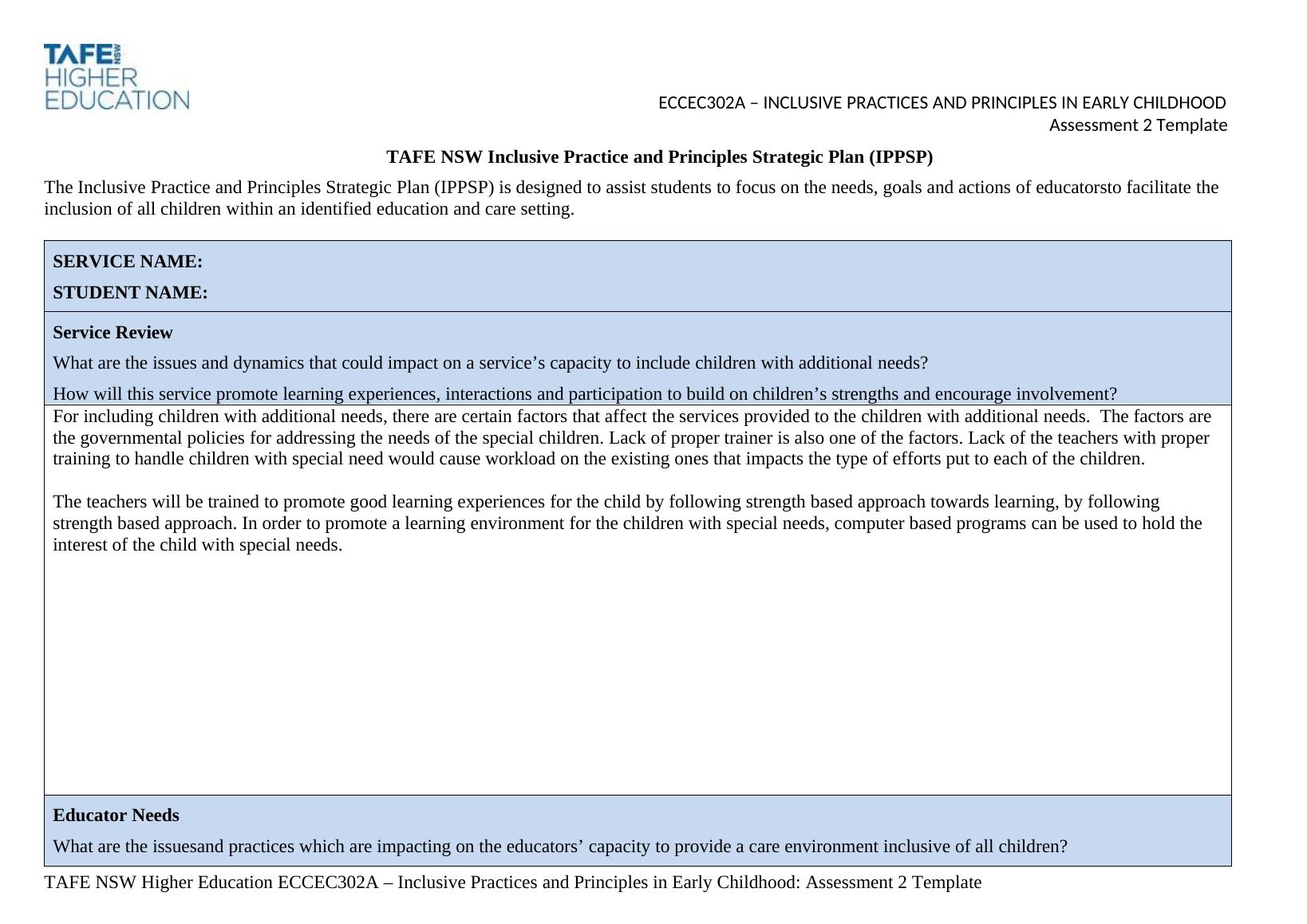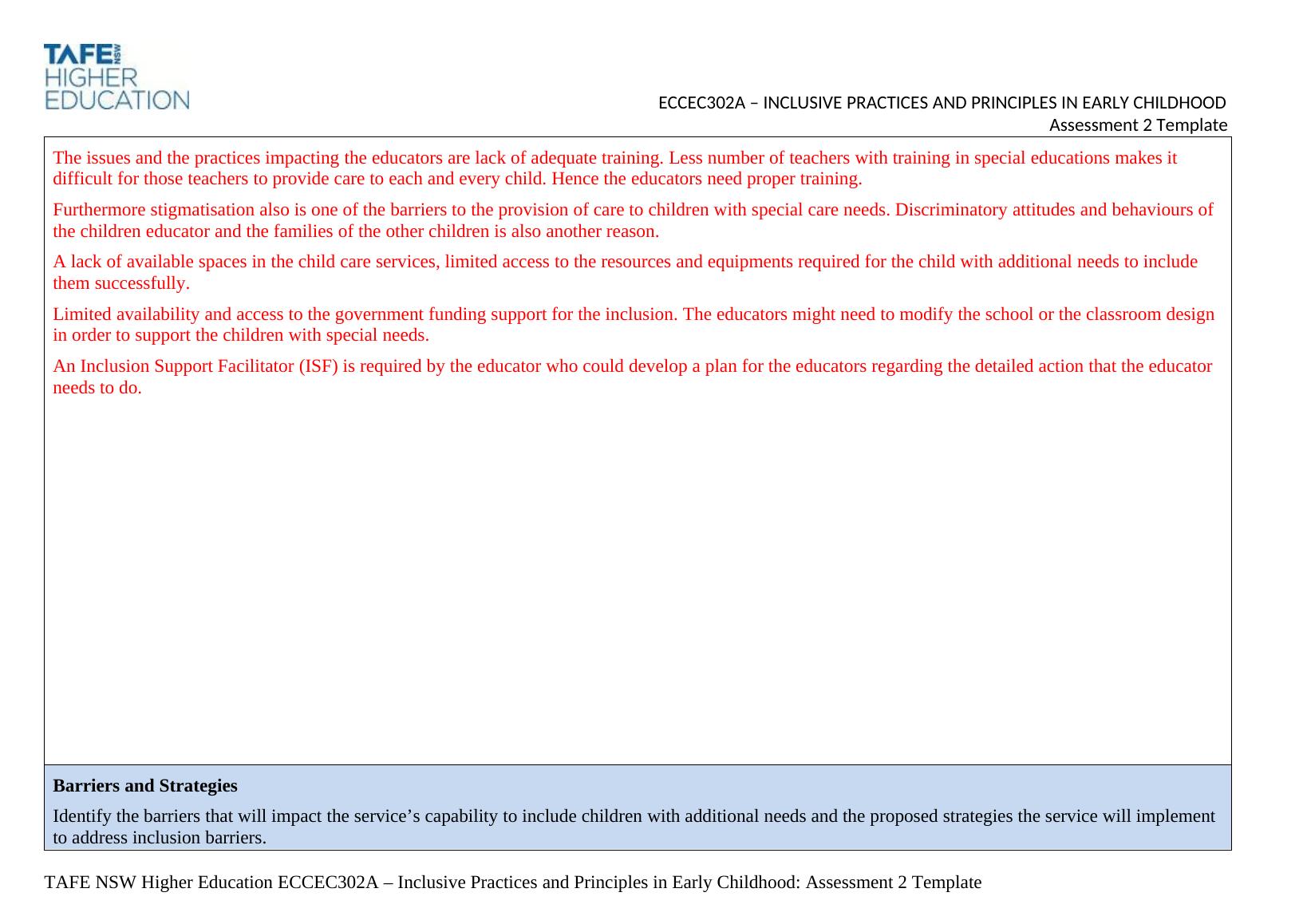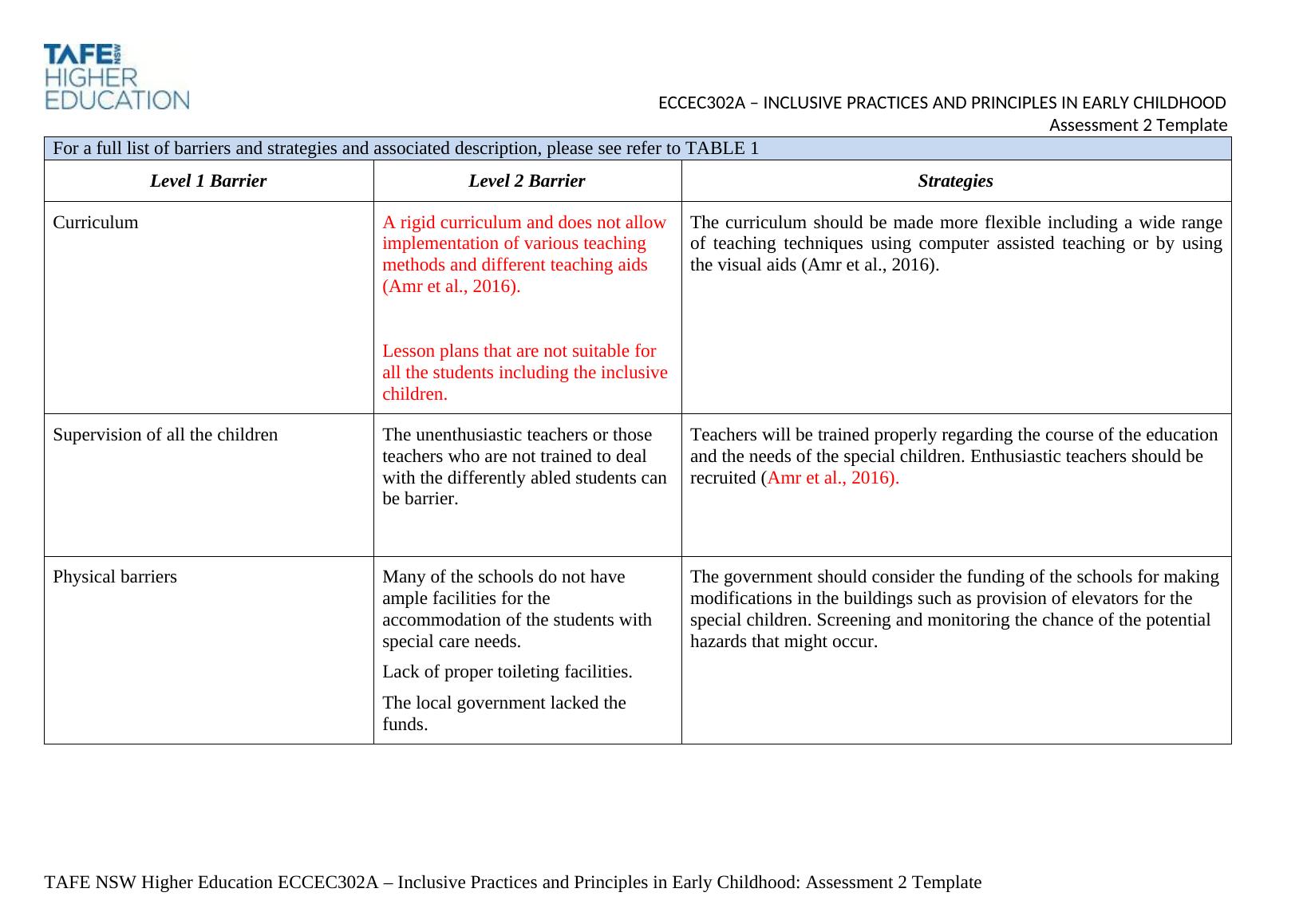Inclusive Practice and Principles Strategic Plan for Early Childhood Education
Added on 2023-06-03
8 Pages1852 Words378 Views
ECCEC302A – INCLUSIVE PRACTICES AND PRINCIPLES IN EARLY CHILDHOOD
Assessment 2 Template
TAFE NSW Inclusive Practice and Principles Strategic Plan (IPPSP)
The Inclusive Practice and Principles Strategic Plan (IPPSP) is designed to assist students to focus on the needs, goals and actions of educatorsto facilitate the
inclusion of all children within an identified education and care setting.
SERVICE NAME:
STUDENT NAME:
Service Review
What are the issues and dynamics that could impact on a service’s capacity to include children with additional needs?
How will this service promote learning experiences, interactions and participation to build on children’s strengths and encourage involvement?
For including children with additional needs, there are certain factors that affect the services provided to the children with additional needs. The factors are
the governmental policies for addressing the needs of the special children. Lack of proper trainer is also one of the factors. Lack of the teachers with proper
training to handle children with special need would cause workload on the existing ones that impacts the type of efforts put to each of the children.
The teachers will be trained to promote good learning experiences for the child by following strength based approach towards learning, by following
strength based approach. In order to promote a learning environment for the children with special needs, computer based programs can be used to hold the
interest of the child with special needs.
Educator Needs
What are the issuesand practices which are impacting on the educators’ capacity to provide a care environment inclusive of all children?
TAFE NSW Higher Education ECCEC302A – Inclusive Practices and Principles in Early Childhood: Assessment 2 Template
Assessment 2 Template
TAFE NSW Inclusive Practice and Principles Strategic Plan (IPPSP)
The Inclusive Practice and Principles Strategic Plan (IPPSP) is designed to assist students to focus on the needs, goals and actions of educatorsto facilitate the
inclusion of all children within an identified education and care setting.
SERVICE NAME:
STUDENT NAME:
Service Review
What are the issues and dynamics that could impact on a service’s capacity to include children with additional needs?
How will this service promote learning experiences, interactions and participation to build on children’s strengths and encourage involvement?
For including children with additional needs, there are certain factors that affect the services provided to the children with additional needs. The factors are
the governmental policies for addressing the needs of the special children. Lack of proper trainer is also one of the factors. Lack of the teachers with proper
training to handle children with special need would cause workload on the existing ones that impacts the type of efforts put to each of the children.
The teachers will be trained to promote good learning experiences for the child by following strength based approach towards learning, by following
strength based approach. In order to promote a learning environment for the children with special needs, computer based programs can be used to hold the
interest of the child with special needs.
Educator Needs
What are the issuesand practices which are impacting on the educators’ capacity to provide a care environment inclusive of all children?
TAFE NSW Higher Education ECCEC302A – Inclusive Practices and Principles in Early Childhood: Assessment 2 Template

ECCEC302A – INCLUSIVE PRACTICES AND PRINCIPLES IN EARLY CHILDHOOD
Assessment 2 Template
The issues and the practices impacting the educators are lack of adequate training. Less number of teachers with training in special educations makes it
difficult for those teachers to provide care to each and every child. Hence the educators need proper training.
Furthermore stigmatisation also is one of the barriers to the provision of care to children with special care needs. Discriminatory attitudes and behaviours of
the children educator and the families of the other children is also another reason.
A lack of available spaces in the child care services, limited access to the resources and equipments required for the child with additional needs to include
them successfully.
Limited availability and access to the government funding support for the inclusion. The educators might need to modify the school or the classroom design
in order to support the children with special needs.
An Inclusion Support Facilitator (ISF) is required by the educator who could develop a plan for the educators regarding the detailed action that the educator
needs to do.
Barriers and Strategies
Identify the barriers that will impact the service’s capability to include children with additional needs and the proposed strategies the service will implement
to address inclusion barriers.
TAFE NSW Higher Education ECCEC302A – Inclusive Practices and Principles in Early Childhood: Assessment 2 Template
Assessment 2 Template
The issues and the practices impacting the educators are lack of adequate training. Less number of teachers with training in special educations makes it
difficult for those teachers to provide care to each and every child. Hence the educators need proper training.
Furthermore stigmatisation also is one of the barriers to the provision of care to children with special care needs. Discriminatory attitudes and behaviours of
the children educator and the families of the other children is also another reason.
A lack of available spaces in the child care services, limited access to the resources and equipments required for the child with additional needs to include
them successfully.
Limited availability and access to the government funding support for the inclusion. The educators might need to modify the school or the classroom design
in order to support the children with special needs.
An Inclusion Support Facilitator (ISF) is required by the educator who could develop a plan for the educators regarding the detailed action that the educator
needs to do.
Barriers and Strategies
Identify the barriers that will impact the service’s capability to include children with additional needs and the proposed strategies the service will implement
to address inclusion barriers.
TAFE NSW Higher Education ECCEC302A – Inclusive Practices and Principles in Early Childhood: Assessment 2 Template

ECCEC302A – INCLUSIVE PRACTICES AND PRINCIPLES IN EARLY CHILDHOOD
Assessment 2 Template
For a full list of barriers and strategies and associated description, please see refer to TABLE 1
Level 1 Barrier Level 2 Barrier Strategies
Curriculum A rigid curriculum and does not allow
implementation of various teaching
methods and different teaching aids
(Amr et al., 2016).
Lesson plans that are not suitable for
all the students including the inclusive
children.
The curriculum should be made more flexible including a wide range
of teaching techniques using computer assisted teaching or by using
the visual aids (Amr et al., 2016).
Supervision of all the children The unenthusiastic teachers or those
teachers who are not trained to deal
with the differently abled students can
be barrier.
Teachers will be trained properly regarding the course of the education
and the needs of the special children. Enthusiastic teachers should be
recruited (Amr et al., 2016).
Physical barriers Many of the schools do not have
ample facilities for the
accommodation of the students with
special care needs.
Lack of proper toileting facilities.
The local government lacked the
funds.
The government should consider the funding of the schools for making
modifications in the buildings such as provision of elevators for the
special children. Screening and monitoring the chance of the potential
hazards that might occur.
TAFE NSW Higher Education ECCEC302A – Inclusive Practices and Principles in Early Childhood: Assessment 2 Template
Assessment 2 Template
For a full list of barriers and strategies and associated description, please see refer to TABLE 1
Level 1 Barrier Level 2 Barrier Strategies
Curriculum A rigid curriculum and does not allow
implementation of various teaching
methods and different teaching aids
(Amr et al., 2016).
Lesson plans that are not suitable for
all the students including the inclusive
children.
The curriculum should be made more flexible including a wide range
of teaching techniques using computer assisted teaching or by using
the visual aids (Amr et al., 2016).
Supervision of all the children The unenthusiastic teachers or those
teachers who are not trained to deal
with the differently abled students can
be barrier.
Teachers will be trained properly regarding the course of the education
and the needs of the special children. Enthusiastic teachers should be
recruited (Amr et al., 2016).
Physical barriers Many of the schools do not have
ample facilities for the
accommodation of the students with
special care needs.
Lack of proper toileting facilities.
The local government lacked the
funds.
The government should consider the funding of the schools for making
modifications in the buildings such as provision of elevators for the
special children. Screening and monitoring the chance of the potential
hazards that might occur.
TAFE NSW Higher Education ECCEC302A – Inclusive Practices and Principles in Early Childhood: Assessment 2 Template

End of preview
Want to access all the pages? Upload your documents or become a member.
Related Documents
Inclusion Support Plan Template for Early Childhood Educationlg...
|6
|850
|429
Reflective Practice in Early Childhood Education - CHCPRP003lg...
|31
|7161
|71
CHCECE007 Develop Positive and Respectful Relationships with Children: Theory Taskslg...
|41
|8388
|339
CHCECE011 Provide experiences to support children’s play and learninglg...
|32
|7203
|80
Planning Cluster Off-the-job Assessment Onelg...
|37
|6559
|429
Children's Behaviour Assignmentlg...
|9
|514
|132
